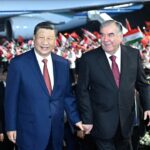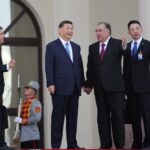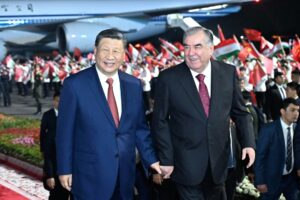(Berlin, April 28, 2023) – German government officials should ensure that talks with President Shavkat Mirziyoyev of Uzbekistan during his visit to Berlin in early May 2023 prominently feature human rights concerns, Human Rights Watch said today.
The Uzbek president’s visit to Germany takes place just days after a constitutional referendum in Uzbekistan on April 30, which Uzbek officials have claimed will usher in a “New Uzbekistan.” On May 3, Tthe Uzbek president will meet withon May 3 German President Frank-Walter Steinmeier, along with other high- level German officials.
“Germany will offer the Uzbek president a warm welcome but this should not come at the expense of a frank exchange on human rights concerns,” said Hugh Williamson, the Berlin-based Europe and Central Asia director at Human Rights Watch. “Given the Uzbekistan-German bilateral relationship, Germany has an important role to play in urging President Mirziyoyev to make good on his many reform promises.”
Trade and investment are expected to feature prominently in the talks. German-Uzbek bilateral trade has recently experienced “dynamic growth,” amounting to approximately €1.3 billion euros in 2022. In addition, Germany is seeking closer political ties to Uzbekistan, also in the context of support for Ukraine in response to the Russian invasion. The German foreign minister, Annalena Baerbock, visited the country in October 2022.
But human rights developments in Uzbekistan in the last year highlight the urgent need for President Mirziyoyev to reprioritize implementation of his reform agenda and for Germany to urge the president and other officials to follow through on human right pledges, Human Rights Watch said.
Uzbek authorities have yet to ensure accountability for the 21 people who were killed and at least 270 who were injured in street protests in the autonomous region of Karakalpakstan in July 2022. The protests were against proposed constitutional amendments that would have removed from Uzbekistan’s constitution Karakalpaks’ right to vote on independence in a referendum and a reference to the region’s sovereign status. The amendments were later withdrawn.
Human Rights Watch found that Uzbek security forces used excessive, lethal force to disperse the mainly peaceful protesters. While Uzbek authorities have prosecuted over five dozen people, including lawyers and journalists, for their alleged role in the Karakalpakstan protests, not a single law enforcement officer has been held accountable for the deaths or injuries of protesters.
The court hearing the cases against the Karakalpakstan protesters also ignored torture and ill-treatment claims by the main defendant, Dauletmurat Tajimuratov, sentencing him to 16 years in prison. On April 19, Tajimuratov’s lawyer issued a video statement alleging that Tajimuratov continues to face abuse and beatings in detention. Impunity for torture and ill-treatment remains the norm in Uzbekistan.
German officials should also press the Uzbek president to do more than pay lip service to the importance of media and speech freedoms, Human Rights Watch said. Uzbek authorities have increasingly targeted outspoken and critical bloggers with spurious criminal charges and imprisonment in recent years. In early March, nearly 50 journalists and activists in Uzbekistan signed an open letter to President Mirziyoyev raising concerns about “serious obstacles, pressure and intimidation” media workers face in Uzbekistan today.
Defamation and insult, including insulting the president, remain criminal offenses, despite President Mirziyoyev’s pledge in 2020 to decriminalize both offenses. A draft Information Code, published in mid-December 2022, includes provisions that would violate freedom of expression if adopted.
Uzbekistan’s Prosecutor General’s office published a draft Criminal Code in February 2021, but since then, its review has stalled. The draft retains many problematic articles that are contrary to international human rights standards, including overbroad extremism and incitement provisions, and criminalization of consensual same-sex relations between men.
In addition, Uzbek authorities have made no effort in recent years to pass the stalled draft code for nongovernmental organizations, but in June 2022 passed a decree requiring local groups that receive foreign funding to cooperate with a state-appointed national partner, ensuring government control over the way they carry out their activities.
Germany should urge President Mirziyoyev to ensure that independent organizations can register and operate without government interference, and that the new Criminal Code removes or amends all rights-violating provisions, Human Rights Watch said.
On April 30, Uzbekistan will vote in a constitutional referendum that would give citizens the right to appeal to the constitutional court when their constitutional rights and freedoms may have been violated (art 54), guarantee equal rights for men and women (art 44), and prohibit the death penalty (art 25), among other positive provisions. However, the new constitution, if adopted, will extend the Uzbek president’s term in office from five5 to 7 seven years, and will enable President Mirziyoyev to run for two more terms in office.
“With the constitutional reforms paving the way for President Mirziyoyev to stay in power for many more years, it is critical for Germany to put human rights concerns on par with other agenda items in its bilateral relationship with Uzbekistan,” Williamson said. “President Mirziyoyev should hear loud and clear that in his ‘New Uzbekistan,’ human rights reforms need to continue apace.”
Source : Human Rights Watch















